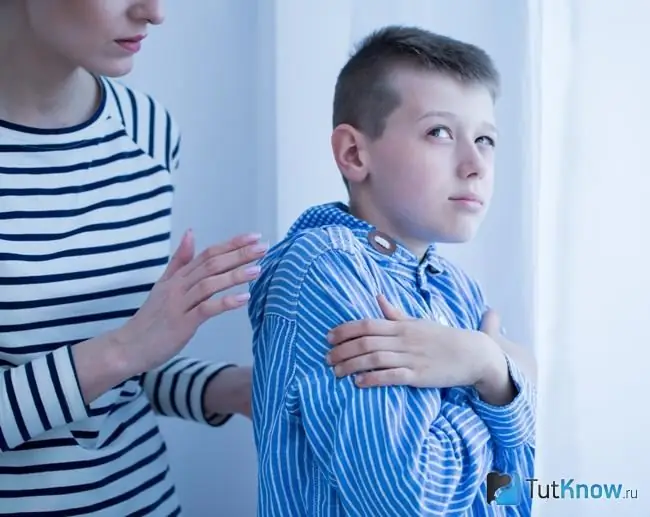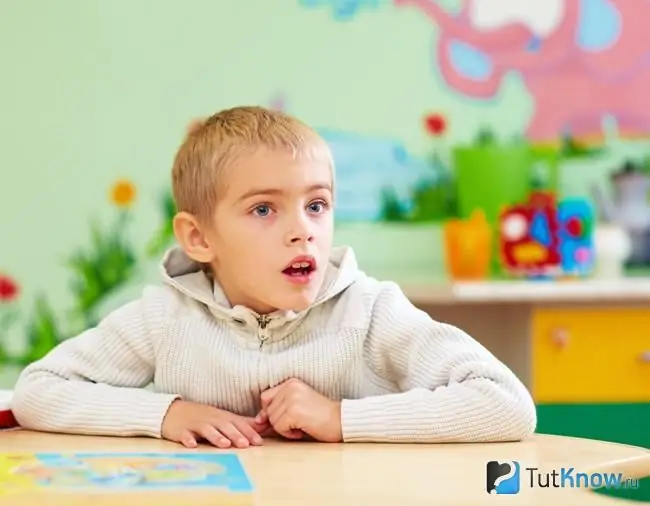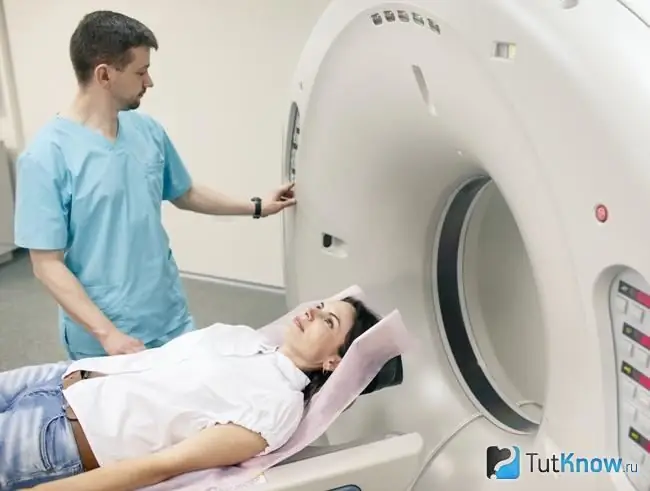- Author Arianna Cook cook@women-community.com.
- Public 2023-12-17 14:23.
- Last modified 2025-01-23 09:40.
General characteristics of mutism. The causes of the pathology and its main symptoms. Diagnostics and correction of sounded psychomotor illness. Mutism (mutus) is a serious disease that is associated with impaired psychomotor in humans. This disorder implies the fact that the subject is unable to answer the questions posed to him. At the same time, he is not diagnosed with problems with the speech apparatus and he perfectly hears the interlocutor. In order to most effectively deal with this problem, you need to know all the nuances of the sounded ailment.
Description of the disease mutism

First of all, K. O. Yagelsky, who pointed out mutism among the main symptoms of hysterical disorder. Then the famous German psychiatrist E. Kraepelin joined the work, taking as the basis of his activities the research of Karl Ludwig Kalbaum (the founder of the doctrine of catatonia). Both experts believed that mutism is one of the constituent disorders that occur due to movement disorders. This theory was practiced in German medicine for a long time until French psychiatrists got down to business.
Sigmund Freud's teacher, J. M. Charcot, considered mutism in the context of a disease such as hysteria. He explained his conclusions by the fact that his patients, after suffering stress, for some time lost the power of speech, while understanding the questions addressed to them. In addition, they could clearly describe on paper everything they felt at the moment of their disappearance of the ability to speak.
Nowadays, among specialists, points of view regarding mutism differ somewhat. Psychologists consider him an inability to find his place in society. Neurologists are of the opinion that he is the most common neurosis. Psychiatrists are not so loyal in their conclusions. They attribute the described disease to mental abnormalities along with schizophrenia and hysteria.
Causes of mutism
This pathology can develop at any time. Therefore, the causes of mutism should be considered from the point of view of the age category.
Factors provoking the development of mutism in children

The sounded state of the younger generation is in some cases confused with severe mental illness. Such conclusions do not quite correspond to the truth, because the following factors become the sources of specific dumbness in children:
- Deformation of the speech organs … With a short bridle or "cleft palate", the child's verbal activity is disturbed, as a result of which he may become silent.
- ZPR … With mental retardation, children do not always fully understand the questions posed to them. At the same time, a "voluntary" dumbness may become their defensive reaction.
- Schizophrenia … Severe mental illness is always characterized by a distortion of consciousness, which is often accompanied by persistent mutism.
- Autism … With this ailment, children differ from their peers not only by immersion in their inner world, graceful, pretentious movements, but in some cases by mutism.
- Genetic predisposition … If there have already been cases of such psychomotor pathology in the child's family, then he has an increased risk of getting the sounded disease by inheritance.
- Severe shock … In this situation, we can talk about physical or sexual violence, the death of parents or observation in the past of a critical situation (terrorist attack, natural disaster, murder, road accident, etc.). An example is the 6-year-old girl Sally (the heroine of the movie House of Cards), who fell silent after the death of her father, an archaeologist. Her mother had to make every effort to get her baby to speak again.
- Change in social status … Many children at the age of 3 cross the threshold of a preschool for the first time. For some of them, such an experiment becomes a real shock, so educators recommend that parents take their baby out of the garden immediately after lunch for a couple of weeks. However, this time is not enough for the child to adapt to the new environment. Silence in some cases becomes a protective shield from society for small persons. A similar process can occur when children become first graders.
- Wrong family upbringing … Some parents believe that screaming, prolonged moralizing and even physical violence will only benefit their offspring. At the same time, they are not at all embarrassed to sort things out among themselves right in the presence of the child. As a result, their son or daughter withdraws into himself and stops talking to the tyrants of the house.
Reasons for the formation of mutism in adults

At an older age, mutism usually manifests itself in the fair sex. However, experts give examples when this diagnosis was made to adult men. The following factors can be considered the prerequisites for the formation of mutism in adults:
- Increased sensitivity … If this quality is accompanied by hypertrophied suspiciousness, then it is quite possible that after the next impulsive-emotional reaction a person will acquire the described syndrome.
- Stroke … After suffering a circulatory disorder, the affected side is diagnosed with damage to those parts of the brain that are responsible for speech activity.
- Vocal cord problems … They can be caused either by their damage or by complete paralysis of these muscle folds.
- Larynx removal … A similar surgical intervention is carried out in the case of diagnosing malignant neoplasms in this area.
- Postponed coma … When leaving this state, the victim first recognizes loved ones, understands them, and only then restores his own speech activity.
Note! If mutism is caused by hysteria in an adult, then the course of the disease will be temporary. However, with the next emotional outburst, the muteness may return.
Varieties of mutism

This pathology has five forms, each of which has its own characteristics:
- Catatonic mutism … Such a disorder is an unmotivated factor, because the mechanism of its formation does not depend on the influence of external circumstances. At the same time, nothing prevents a person from communicating, but his mutism is based on such a concept as negativism.
- Psychogenic mutism … The very name of the variety of the described disease suggests that we are talking about a post-traumatic reaction to anxiety or tragic events suffered.
- Hysterical mutism … With this type of conversion disorder, some individuals want to gain public attention by silence. The sounded psychological muteness is usually inherent in children and women. Experts noted the fact that the voiced phenomenon is quite rare in older people.
- Akinetic (organic mutism) … In this case, we will focus on serious brain damage. Tumors and gunshot wounds can cause this kind of disorder.
- Selective mutism … In a certain situation and only with a limited circle of people, a person with such a diagnosis is ready to start a dialogue. In other cases, dumbness attacks him.
The main symptoms of mutism syndrome

Some people are naturally laconic and try to get off with gestures when the question is asked (nodding their heads, raising their arms). However, one can suspect a person of mutism even when meeting, if he exhibits the following personality traits:
- Nervousness … Any of us is afraid of the moment that he might be ridiculed by someone. Some persons who do not have a sense of tact may even rudely “support” the dialogue with the phrases “the deaf were lucky” or “pull the cotton wool out of the ears”. As a result, a child or an adult with a voiced problem will already be waiting for ridicule in advance and will start to get nervous.
- Social awkwardness … It is difficult to feel like a fish in water, in a team or alone with one person, if the resulting dumbness does not provide an opportunity to enter into a dialogue. It is for this reason that people with mutism syndrome look like a "black sheep" in society.
- "Thorniness" … Some persons (especially children) not only show painful silence, but also build an invisible wall around themselves. Anyone who tries to cross its borders, they perceive with hostility.
- Excessive shyness … Even very shy people answer their interlocutor in monosyllables. People with a diagnosis of "mutism" can use gestures to respond to the question posed to them as much as possible.
- Lethargy … In the presence of psychological dumbness, which is accompanied by a delay in mental development, those around them end up dealing with a person who practically does not react to them.
All of the listed personality traits do not mean at all that we are talking about a person with whom you should not deal. People with mutism syndrome are not proud, but simply cannot look other people in the eye. This is due to the fact that, in addition to the voiced problem, they are maladjusted in society.
The signs by which this pathology can be determined are quite pronounced. Symptoms of mutism in children and adults are usually as follows:
- Avoiding verbal communication … Some people may speak, but for whatever reason they flatly refuse to do so. As a result, they will try to respond either with gestures, or they will avoid any contact with the environment.
- Clarity of thoughts … If we are not talking about mental retardation, schizophrenia or hysteria, a person with signs of mutism can perfectly analyze the events taking place around him.
- Ability to state mindfulness on paper … With the same aphasia, people will not be able to perform the voiced actions. During the "vow of silence" a person does not lose such skills.
- Propensity for non-verbal communication … Sometimes it is quite enough for such persons to answer the question by nodding their heads, raising their arms or using facial expressions.
Diagnostics of the disease mutism

The most difficult thing is to draw a conclusion about a child, because the line between his simple whim, an act of protest and psychological disorder is very arbitrary.
Some optimistic parents believe that "voluntary" muteness will go away on its own as their offspring matures. As a result, the disease takes on a chronic form, and it will take a lot of time to treat it. In order to avoid the aforementioned consequences, at the very first alarming symptoms, the following diagnosis of mutism is carried out:
- General collection of information … The therapist will first of all analyze how the pregnancy of the expectant mother proceeded and what injuries / infections she suffered during gestation. Then he will identify the reaction of the little patient to vaccinations, and also follow the dynamics of his development. Further, the psychologist, relying on the therapist's diagnostics, will talk with the child in order to identify all his secret and obvious phobias in order to properly organize the course of treatment in the future.
- Examination by a neurologist … The sounded specialist will conduct a number of studies, which will include an assessment of the quality of speech, reflexes, breathing rhythm of a baby or adolescent. Then he will measure the child's pressure and analyze the presence / absence of any neurological pathologies in the patient (strabismus, facial asymmetry, etc.).
- Craniogram … To draw conclusions about how the patient's brain looks (volume, structure), an X-ray of the skull is taken.
- CT (computed tomography) and MRI (magnetic resonance imaging) … The sounded diagnostic methods perform the same function as the craniogram, but with a more accurate and detailed result.
- EEG (electroencephalography) … Without analyzing the level of electrophysiological processes that take place in the child's brain, it is impossible to create a complete clinical picture of such a psychomotor disease as mutism.
- Analysis of urine and blood … In addition to the main indicators, the specialist will need to familiarize himself with the level of hormones in the sounded biological fluids.
As necessary, parents will have to go through a series of additional studies. It may be necessary to consult a defectologist, speech therapist and psychiatrist.
Features of the treatment of mutism
Modern practice allows you to get rid of or smooth out the symptoms of this specific dumbness. At the same time, it should be remembered that it is necessary to act in many directions of influence on the patient: psychological, neurological, psychiatric and speech therapy.
Psychological advice for correcting mutism in a child

The sounded pathology is primarily a childhood illness. At the very first deviations in the child's behavior, it is imperative to be examined by specialists. If necessary, they will prescribe medication and even surgery (in case of deformation of the speech organs).
In turn, at home, the older generation of a family with mutism in children can help them in the following way:
- Creating a welcoming environment … In a home where peace and understanding reign, children rarely, for some unknown reason, fall silent. The child should feel that he is loved and listened to everything he has to say.
- Adequacy in punishment … It is definitely not necessary to indulge any whim of your offspring. However, practice shows that the child's psyche often does not withstand cruelty and injustice from adults. Instead of physical violence, it is better to succinctly explain to a son or daughter what their fault lies.
- Prohibition of unbearable demands … Painful silence is often formed in those children on whom their parents have taken a burden that is unbearable for their age. If the once cheerful child suddenly fell silent, then the criterion of the requirements raised to him should be revised.
- Keeping promises … Children believe that their parents are omnipotent and always keep their word. Experts described one case when a girl did not react to her father and mother for almost six months, because instead of having a rest together, they preferred to take up a new project.
- Change of environment of the child … If selective mutism has formed after a psychological trauma, then parents need to find a new childcare facility or stop communicating with the person who frightens their offspring.
- Role-playing games … As the main character, you can choose a toy dog that does not want to talk to anyone. As topics, it is recommended to enumerate the following situations: the animal is lost - passers-by cannot help the silent poor fellow or the owner is very bad - his four-legged friend with mutism is not able to call for help. The child is invited not only to feel the proposed scene, but also to come up with its completion, at least with the help of gestures or writing on paper. Over time, he will have a desire to express his opinion out loud about what is happening.
- Regular visits to specialists … Do not underestimate the help that the same neurologist and psychologist can provide. Especially such family visits are necessary in the case of psychogenic and hysterical mutism. Classes with a speech therapist are also needed when the diagnosis is made in the form of "voluntary" dumbness.
If the child received any injury, began to behave in a strange way and became silent, then urgent action is necessary. Some parents are categorically against the recommendation to visit a psychiatrist with their child, considering this a stigma for life for the whole family. With such inaction and elementary ignorance, they cause irreparable harm to the child, because the disease then becomes persistent.
Traditional therapy for mutism syndrome

There are a large number of techniques that allow you to help a patient with "voluntary" silence. Correction of mutism with traditional therapy is usually done as follows:
- Breathing exercises … In this case, it is best to find an experienced instructor. He will teach his charge of deep / shallow, frequent / rare, lower / middle / upper and mixed breathing. Having mastered these basics, you can try yoga, which will help coordinate the spiritual and physiological functions of the body.
- Massage … It will be needed not only in order to stretch the muscles. With the help of it, the body will calm down and recover faster after suffering physical or psychological trauma. Hydromassage can be used as an alternative to sound therapy.
- Acupuncture … Acupuncture with mutism will help the patient fight certain pathologies of the nervous system. It is appointed by a specialist, and in case of unauthorized actions, acupuncture will turn into a disability.
- Art therapy … Some people believe that this technique is only applicable to children. However, the correction of mutism in adults also involves working with the color gamut and finding with its help the most unexpected solutions.
- Phototherapy … People of all ages love to view pictures (especially family pictures). If a person is silent in protest, then he can speak if he sees an exciting moment for him in the photo.
Medicines for the treatment of mutism

In some cases, it is still impossible to do without the use of drugs. It should only be remembered that self-medication will not only not help, but will also cause significant harm to the affected side. Usually, after a thorough examination, the following medications are prescribed to the patient:
- Antidepressants … Their reception is especially necessary for psychogenic mutism. Usually, your doctor will prescribe drugs such as Fluoxetine or Prozac.
- Antipsychotics … These antipsychotic substances are essential for the treatment of mental disorders. Medicines such as Frenolone, Gidazepam and Risperidone will help great in this.
- Benzodiazepines … Such psychoactive drugs have sedative, hypnotic and anxiolytic effects. With mutism, experts most often recommend the use of Gidazepam, Fluorophenazine and Alprazolam.
- Nootropic drugs … They are based on vitamin B15, which prolongs human life and helps fight stress. Piracetam, Salbutamine and Oxiracetam are most suitable in this case.
How to treat mutism - watch the video:

Correction of mutism directly depends on what caused its occurrence and how long the disease lasts. The personal qualities of the injured party are also important in predicting the timing of the upcoming treatment. The main thing is to be patient in order to achieve an exceptionally positive result in the future.

